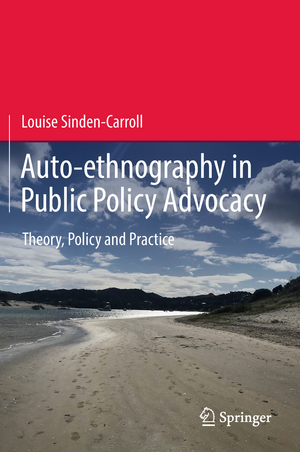Auto-ethnography in Public Policy Advocacy: Theory, Policy and Practice
Autor Louise Sinden-Carrollen Limba Engleză Hardback – 20 aug 2018
By applying these models to the situation of prisoners with hearing loss in New Zealand’s prisons, it identifies multiple causal factors for quality-of-life-limiting marginalization, e.g. social barriers (e.g. disability discrimination); environmental limitations (e.g. geographical and those introduced by incarceration); and individual responses in line with negative attitudes – both social and political, including the State’s denial of prisoners’ right to democratic participation by revoking their right to vote in general elections after sentencing. In addition, two other areas, namely blood safety and broadcast media captioning, are highlighted, showing that the skill of auto-ethnography is transferrable and can be applied to ensure effective consumer advocacy for a diverse range of issues that affect marginalized sectors.
| Toate formatele și edițiile | Preț | Express |
|---|---|---|
| Paperback (1) | 358.01 lei 38-44 zile | |
| Springer Nature Singapore – 23 dec 2018 | 358.01 lei 38-44 zile | |
| Hardback (1) | 378.95 lei 38-44 zile | |
| Springer Nature Singapore – 20 aug 2018 | 378.95 lei 38-44 zile |
Preț: 378.95 lei
Nou
Puncte Express: 568
Preț estimativ în valută:
72.51€ • 79.01$ • 61.10£
72.51€ • 79.01$ • 61.10£
Carte tipărită la comandă
Livrare economică 19-25 aprilie
Preluare comenzi: 021 569.72.76
Specificații
ISBN-13: 9789811313219
ISBN-10: 9811313210
Pagini: 227
Ilustrații: XVIII, 187 p. 3 illus. in color.
Dimensiuni: 155 x 235 mm
Greutate: 0.54 kg
Ediția:1st ed. 2019
Editura: Springer Nature Singapore
Colecția Springer
Locul publicării:Singapore, Singapore
ISBN-10: 9811313210
Pagini: 227
Ilustrații: XVIII, 187 p. 3 illus. in color.
Dimensiuni: 155 x 235 mm
Greutate: 0.54 kg
Ediția:1st ed. 2019
Editura: Springer Nature Singapore
Colecția Springer
Locul publicării:Singapore, Singapore
Cuprins
Prisoners with Hearing Loss: Understanding Complex Social Environments.- United Nations Convention on the Rights of Persons with Disabilities: Social Cooperation and Human Dignity.- Auto-ethnographic Models and Public Policy: Prisoners with Hearing Loss in New Zealand.- Hearing Loss in Prisoners Policy Challenges.- Diverse Application of Auto-ethnography: Prisoners with Hearing Loss, Broadcast Media Accessibility and Blood Safety.- Further Applications of Auto-ethnography.
Notă biografică
Dr. Louise Sinden-Carroll is an accomplished advocate dedicated to improving the quality of life for people with disabilities. She has been on the boards of two global organizations working in the health and disability arena, is the past Chief Executive of The National Foundation for the Deaf in New Zealand, has worked on a voluntary basis as the Human Rights Officer and then General Secretary of the International Federation of Hard of Hearing People and is a current Trustee of the Human Rights for All Trust in New Zealand.
Textul de pe ultima copertă
This book explores how public policy advocacy can be used to approach policy issue identification, resolution or, at the least, support the management of wicked policy issues. By describing how this type of advocacy draws on participatory action research, including ethnographic and auto-ethnographic models, this book offers a tool for public policy consumer advocates on how to apply the Human Capabilities Approach to address presenting public policy issues worldwide.
By applying these models to the situation of prisoners with hearing loss in New Zealand’s prisons, it identifies multiple causal factors for quality-of-life-limiting marginalization, e.g. social barriers (e.g. disability discrimination); environmental limitations (e.g. geographical and those introduced by incarceration); and individual responses in line with negative attitudes – both social and political, including the State’s denial of prisoners’ right to democratic participation by revoking their right to vote in general elections after sentencing. In addition, two other areas, namely blood safety and broadcast media captioning, are highlighted, showing that the skill of auto-ethnography is transferrable and can be applied to ensure effective consumer advocacy for a diverse range of issues that affect marginalized sectors.
By applying these models to the situation of prisoners with hearing loss in New Zealand’s prisons, it identifies multiple causal factors for quality-of-life-limiting marginalization, e.g. social barriers (e.g. disability discrimination); environmental limitations (e.g. geographical and those introduced by incarceration); and individual responses in line with negative attitudes – both social and political, including the State’s denial of prisoners’ right to democratic participation by revoking their right to vote in general elections after sentencing. In addition, two other areas, namely blood safety and broadcast media captioning, are highlighted, showing that the skill of auto-ethnography is transferrable and can be applied to ensure effective consumer advocacy for a diverse range of issues that affect marginalized sectors.
Caracteristici
Demonstrates the application of ethnography and participatory action research to ensure best policy outcomes Explains how auto-ethnography can build a bridge across disparate sectors Outlines how auto-ethnography can be used to reveal failures to capitalise on policy opportunities Frames the capabilities of prisoners with hearing loss in a human rights context
